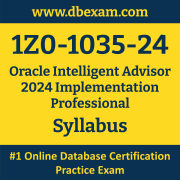 You can use this Oracle 1Z0-1035-24 exam study guide to collect all the information about the Oracle Intelligent Advisor 2024 Implementation Professional exam. The Oracle 1Z0-1035-24 certification exam is mainly targeted to those candidates who have some experience or exposure to Oracle Intelligent Advisor technology and want to flourish their career with Oracle Intelligent Advisor 2024 Certified Implementation Professional credential.
You can use this Oracle 1Z0-1035-24 exam study guide to collect all the information about the Oracle Intelligent Advisor 2024 Implementation Professional exam. The Oracle 1Z0-1035-24 certification exam is mainly targeted to those candidates who have some experience or exposure to Oracle Intelligent Advisor technology and want to flourish their career with Oracle Intelligent Advisor 2024 Certified Implementation Professional credential.
The Oracle 1Z0-1035-24 certification exam validates your understanding of the Oracle Intelligent Advisor technology and sets the stage for your future progression. Your preparation plan for Oracle Intelligent Advisor 2024 Implementation Professional Certification exam should include hands-on practice or on-the-job experience performing the tasks described in following certification exam syllabus topics.
Oracle 1Z0-1035-24 Exam Details:
| Exam Name | Oracle Intelligent Advisor 2024 Implementation Professional |
| Exam Code | 1Z0-1035-24 |
| Exam Price | USD $245 (Pricing may vary by country or by localized currency) |
| Duration | 90 minutes |
| Number of Questions | 50 |
| Passing Score | 68% |
| Format | Multiple Choice Questions (MCQ) |
| Recommended Training | Become a Certified Intelligent Advisor Implementer |
| Schedule Exam | Buy Oracle Training and Certification |
| Sample Questions | Oracle Intelligent Advisor 2024 Certified Implementation Professional |
| Recommended Practice | 1Z0-1035-24 Online Practice Exam |
Oracle 1Z0-1035-24 Syllabus Topics:
| Understanding Rules/User Interface in Intelligent Advisor (IA) |
- Describe a policy modeling project and key Intelligent Advisor components
- Describe options for running and testing a policy model |
| Writing Attributes and Attribute Text |
- Define variable attributes and use them in logical comparisons
- Explain the appropriate use of value lists in attributes - Construct boolean and non-boolean attributes from difficult source material - Define appropriate attribute phrasing and reparsing scenarios |
| Writing Rules and Negations |
- Identify the various components of a rule and verify how rules are linked
- Identify the appropriate styles for writing rules - Validate and check rules - Explain how to avoid using multiple conclusions |
| Constructing Conclusions and Conditions |
- Identify conclusions and conditions in source material
- Use tables for rules with MS Word and MS Excel - Analyze networks of rules including attribute levels |
| Grouping Operators and Intermediate Attributes |
- Explain the correct use of AND and OR in the same rule using a grouping operator
- Write more complex rules in MS Word by grouping words or phrases |
| Using Comparisons and Calculations in Rules |
- Compare one attribute to another attribute as a condition of a rule
- Use functions in the rule conclusion - Perform calculations in a rule using complex expressions |
| Defining Entities and Relationships | - Define entities, entity-level attributes, and entity relationships |
| Using Entities and Reasoning with Entities |
- Model entity rules from source material
- Identify reasoning from one entity to another - Create rules that use relationships/infer entities - Use built-in entity functions in rules |
| Testing Rules |
- Create and save basic test cases
- Test entities/relationships and interviews in the debugger |
| Creating Interviews |
- Create a basic interview
- Control the interactions on and between screens - Create interview screens that collect entity instances and entity-level data |
| Enhancing Interviews |
- Explain the purpose and use of goals and checkpoints in an interview
- Use controls for creating Interview screens including conditional logic - Describe how policy models can be used in other languages |
| Performing Data Validation | - Prevent or warn a user from entering invalid data or combinations of data based on inferred logic |
| Using Explanations, Audit Reports, and Forms | - Differentiate explanations and audit reports |
| Deploying Intelligent Advisor Hub |
- Administer users, deployments, and projects on the Intelligent Advisor Hub
- Deploy and update projects on the Hub from Policy Modeler |
| Setting up Data Mapping, Integration, Connector Framework, and Mobile |
- Set up data mappings for a B2C Service interview
- Automate decisions with a web service - Explain the features of Intelligent Advisor mobile applications and related APIs |
|
Embedding an Interview in Customer Portal, Agent Desktop, BUI, and Chat
|
- Embed an interview in Customer Portal, Agent Desktop, BUI, and Chat |
| Collaborating on Projects | - Use collaboration features on team projects |
|
Creating Hub Projects
|
- Create Hub Projects, Decision Services, and Flows |
| Using AI Capabilities in Intelligent Advisor |
- Understand how to leverage Oracle’s pervasive AI approach in Oracle Cloud Applications
- Describe the integration and application of AI within the Oracle CX ecosystem - Use AI to assist authoring in Fusion Interviews |
The Oracle Intelligent Advisor Implementation Professional Certification Program certifies candidates on skills and knowledge related to Oracle Intelligent Advisor products and technologies. The Oracle 1Z0-1035-24 is granted based on a combination of passing exams, training, and performance-based assignments, depending on the level of certification. Oracle Intelligent Advisor 2024 Implementation Professional certification is a real benchmark of experience and expertise that helps you stand out in a crowd among employers. To ensure success, Oracle recommends combining education courses, practice exams, and hands-on experience to prepare for your Oracle Intelligent Advisor 2024 Certified Implementation Professional certification exam as questions will test your ability to apply the knowledge you have gained in hands-on practice or professional experience.
